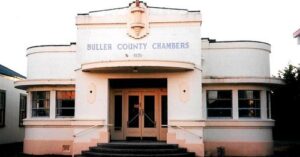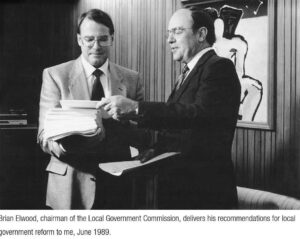1989: Brian’s Revolution
August 27, 2022
By AHNZ
 Ask a New Zealander who their greatest revolutionary reformer is and they will not say it is Brian Elwood or even know the name. If he knows his history the 1890s Liberals such as Ballance or Seddon will be suggested, or the 1930s First Labour Government, but he would be wrong. Nor is it Labour 4.0’s Geoffrey Palmer who only wrote books and had the reputation as a constitutionalist. The real Kiwi Solon didn’t just talk about revolutionary reform; He carried it out. Brian Elwood’s Revolution of 1989 is largely unsung except by himself in a few collected speeches however he deserves the credit, or, rather, the blame, for re-inventing the New Zealand State. Asked 2000 years ago if he had given his city, Athens, the best of all laws the great constitutionalist Solon answered by saying he had given them “the best they could receive.” Our Kiwi Solon, Elwood, certainly followed the same road.
Ask a New Zealander who their greatest revolutionary reformer is and they will not say it is Brian Elwood or even know the name. If he knows his history the 1890s Liberals such as Ballance or Seddon will be suggested, or the 1930s First Labour Government, but he would be wrong. Nor is it Labour 4.0’s Geoffrey Palmer who only wrote books and had the reputation as a constitutionalist. The real Kiwi Solon didn’t just talk about revolutionary reform; He carried it out. Brian Elwood’s Revolution of 1989 is largely unsung except by himself in a few collected speeches however he deserves the credit, or, rather, the blame, for re-inventing the New Zealand State. Asked 2000 years ago if he had given his city, Athens, the best of all laws the great constitutionalist Solon answered by saying he had given them “the best they could receive.” Our Kiwi Solon, Elwood, certainly followed the same road.
John Stuart Mill’s On Liberty (1859) laid that road out from Solon on down to the time of the beginning of democracy in New Zealand. Our politicians of the time even corresponded with Mill about our local case. In the essay Mill described the early organisation of a governing tribe or caste who derived their authority from inheritance or conquest not consent. This elite would use its power as readily against external enemies as internal ones among its own subjects if they became a threat. The common folk submitting to being ruled by their enemy this way were, at least, protected from all the other enemies out there. This was the condition the West discovered the Maoris in. They knew nothing about Liberty and the best a slave caste member could manage might be to exert a little covert influence to be re-slaved to what they calculated to be a better tribe with better living conditions. The West had departed that early organisation 1000 years before so that when New Zealand was created as a nation its Authorities were delegates of the people themselves with checks upon their misuse of power over the individual. These checks were called, in sum, Liberty. This is more or less what New Zealand was like when Brian Elwood set upon his path of revolution.
Now we came to a new point in the development of this Authority/Liberty problem. As Mill put it, “The nation did not need to be protected against its own will. There was no fear of its tyrannising over itself.” Liberty, even Common Law itself, started to be dispensed with on the grounds that we were all one big family now without the elite/common subject duality that once necessitated things like rights or checks and balances or codes of law or constitutional superstructures. This way of thinking characterised the Unravelling (aka Third Turning) leading up to Elwood’s 1989 Reforms. As he told the Club of Rome in his 1993 address, “I have discovered no universally applicable ideal model of governance…The New Zealand case study is not suggested as the ideal…is working with significant success and was politically achievable.” This is the spirit, if not the prose, of Solon’s attitude toward his countrymen as we have seen.
But what path does that leave the reformer and his nation to follow? Rejecting objective rules and universal ideals only leaves one possibility for an Athens or an England or a New Zealand: People Wrangling. Accountability Theatre. Crowd Control. Legitimacy Perception Opperations. And, of course, that’s what we were given and the stage of constitutional development within which we still remain today.
Civitas, Old and New
 In Old New Zealand (in this case ‘old’ being 1936-1978) our ‘civitas’ was vested in a trusted tribal elite. For example, a town’s mayor and his counsel. As Elwood put it to the Club of Rome, “…the sense of civitas, or civic duty once the preserve of the governing elite..” It was an ‘Old Boys Club’ but in an era where Old Boys Clubs were trusted implicitly and worked effectively and often informally. The local policeman might look the other way at an unlicensed vehicle or driver. He may clip a wayward kid on the ear rather than write tickets and go by the book. According to Gordon McLauchlan (1976) the local Judge at Te Aroha put his car into a ditch while Drunk Under the Influence of alcohol but the police and press kept it quiet and life went on. According to my Aunt council workers once shattered a street’s worth of windows in an explosion to clear a tree stump but, again, it was an event in Old New Zealand where such things could be hushed up smoothed over by the tribal elite. McLauchlan (2012) also writes that in Old New Zealand watchwords such as ‘The Public Good’ and ‘A Social Conscience’ and ‘Citizen’ could be easily invoked to elicit support for social programs. Now they are sentimental and unsuitable relics. But back then Mayors were Mayors. Today they are, as Tim Shadbolt put it, “mayors became little more than show ponies; ribbon cutters; figureheads and promoters for their regions.”
In Old New Zealand (in this case ‘old’ being 1936-1978) our ‘civitas’ was vested in a trusted tribal elite. For example, a town’s mayor and his counsel. As Elwood put it to the Club of Rome, “…the sense of civitas, or civic duty once the preserve of the governing elite..” It was an ‘Old Boys Club’ but in an era where Old Boys Clubs were trusted implicitly and worked effectively and often informally. The local policeman might look the other way at an unlicensed vehicle or driver. He may clip a wayward kid on the ear rather than write tickets and go by the book. According to Gordon McLauchlan (1976) the local Judge at Te Aroha put his car into a ditch while Drunk Under the Influence of alcohol but the police and press kept it quiet and life went on. According to my Aunt council workers once shattered a street’s worth of windows in an explosion to clear a tree stump but, again, it was an event in Old New Zealand where such things could be hushed up smoothed over by the tribal elite. McLauchlan (2012) also writes that in Old New Zealand watchwords such as ‘The Public Good’ and ‘A Social Conscience’ and ‘Citizen’ could be easily invoked to elicit support for social programs. Now they are sentimental and unsuitable relics. But back then Mayors were Mayors. Today they are, as Tim Shadbolt put it, “mayors became little more than show ponies; ribbon cutters; figureheads and promoters for their regions.”
According to Elwood this Old New Zealand was so much ignorant peasantry compared to New New Zealand’s “increasingly educated and liberalised populace.” The Old Civitas didn’t suit the Baby Boomers/’Liberalised Populace’ because they had apparently been educated by Old New Zealand to be far too good for Old New Zealand! When the old patriarchical family system changed the civitas wasn’t far behind. In particular, Elwood offers an equation to explain what had changed in our society to cause the civitas to be re-located. In Old New Zealand the priority was put on Economic and Social Realities. In the New New Zealand Social Goals and Expectations were evaluated as being of equal value as Economic and Social Realities. The Boomers put a priority on Recognition and Worth and, crucially, expected to have these things supplied to them from outside as part of the function of the civitas!
“The Mayor of a town is there to express the will of the people.” – Mayor of Greymouth, 1980s, quoted in Greymouth Star (May, 2022)
“Put another way, in order to retain legitimacy and effectiveness the structures of government and the process of governance should be in harmony not just with the economic and social realities of the times but also with the changing social goals and expectations of the electors.” – Elwood (1994)
“A modern system of governance should be one which can accomodate the simple requirement within each individual for recognition and worth..” – ibid
“In the nature of things today it is inevitable that organisations whether they be commercial or governmental, which fail to remain relevant will find that their malaise will be treated by invasive surgery rather than by sustaining medicine.” – ibid
The legitimacy of government, in the New Civitas, relied upon it providing for the self-esteem needs of the citizen! Or, rather, since such a thing is impossible, providing the perception of doing so.
Elwood saw that, stated that, and met that preference. Opportunity, recognition, and security were all things that the Old Civitas (aka un-educated unliberalised peansant populace) looked to themselves for, not to government to provide. Something about the new generation, perhaps their lack of Attachment and serotonin in the battery-farm-like maternity wards, turned this on its head and opened the way for Elwood’s vision of revolutionary reform. Local Government now became something else.
Outsourcing the Dirty Jobs
 The Local Government reforms were a dramatic change to New Zealand culture carried out, as we have seen, in a secret meeting so as to short-circuit the consent process if not the legal one. Providing the perception of meeting New Zealand’s Self-Esteem needs was the task Elwood recognised was required in order for the elite to continue ruling. Central Government had been ambiguously trying, partly, to avoid accepting such a role while, partly, trying and failing to fulfil such a role; It was the worst of both worlds. Subjects were mistrusting their rulers and threatening to bring the State down unless a new synthesis could be found. Fooling Kiwis into thinking their rulers could ever supply the new list of inflated needs was a dirty job and it was too big, to diverse and neuanced, for Central Government to provide. The solution was to outsource this crowd control function to Local Government.
The Local Government reforms were a dramatic change to New Zealand culture carried out, as we have seen, in a secret meeting so as to short-circuit the consent process if not the legal one. Providing the perception of meeting New Zealand’s Self-Esteem needs was the task Elwood recognised was required in order for the elite to continue ruling. Central Government had been ambiguously trying, partly, to avoid accepting such a role while, partly, trying and failing to fulfil such a role; It was the worst of both worlds. Subjects were mistrusting their rulers and threatening to bring the State down unless a new synthesis could be found. Fooling Kiwis into thinking their rulers could ever supply the new list of inflated needs was a dirty job and it was too big, to diverse and neuanced, for Central Government to provide. The solution was to outsource this crowd control function to Local Government.
This is what Brian Elwood did for the New Zealand State. In his own words, “…it is time for nation state governments to withdraw from some of the detailed interface with the governed…the appropriate role for nation states and their structures and systems of government has changed dramatically.” To some readers Brian makes it appear as if Central Government is giving up power but to those in the know what it really means outsourcing dirty jobs, people wrangling duties, to Local Government.
Central Government, thus, has expanded its powers while appearing not to do so. An entire part of our democratic checks and balances has been relegated to the dirty-job of being the customer-facing people-wrangling job which leaves the rulers free to focus on true power. Local Government is left with crumbs of power and money which is why few quality people stand for election and fewer still are elected. In return for this minor power transfer the local politician, a shadow of their pre-revolution namesakes, are the customer-facing part of government. The fulfil the crowd-control function so Wellington politicians don’t have to and if they should fail the Wellington politician is insulated. Real power doesn’t reside with these “ribbon-cutters and show-ponies” who are paid less than their executive staff but with the Local Government Minister. If a Mayor steps out of line and trys to be more than a cartoon, such as in Tauranga and Westland in the early 2020s, the Minister in Wellington can take over their job and demonstrate where the true power is.
“Lord Edward Buller-Lytton…said: “Reform is a correction of abuses; a revolution is a transfer of power.” In that context what happened to New Zealand local government was both a reform and a revolution.” – Elwood (1994)
“New Zealand has been reformed and revolutionised in almost every respect, from structures to membership, from statutory powers to the means by which its responsibilities can be undertaken from its accounting practices to its public accountability and in terms of councillor remuneration.”- Elwood (1994)
“…the incremental addition of responsibilities upon the national system of government has created a perception [of government failure] ..”The aim of any system should be to enhance the perception that the process of government does acknowledge the interests and concerns of the individual citizen.” – Elwood (1993)
Elwood has detailed “philosophies” and “principles” in his writings that show how he inflicted this dramatic constitutional change to our country.
Accountability Theatre
 Different ethnicities, subcultures, races, regions, religions, generations, fashions, gender identities, and tastes ripple though hetrogenous New Zealand. A Central Government has no hope of keeping up with all the Based, Woke, Maori, Environmentalist, Feminist, etc ‘Current Thing’ so they outsource to a Local Politician who can meet those needs of the community they are in proximity to. What Kool Aid must the public be fed to keep them keeping on? What perception must they be presented with inside the great Skinner Box created for us by Elwood’s reforms? Whatever it is: They shall have it!
Different ethnicities, subcultures, races, regions, religions, generations, fashions, gender identities, and tastes ripple though hetrogenous New Zealand. A Central Government has no hope of keeping up with all the Based, Woke, Maori, Environmentalist, Feminist, etc ‘Current Thing’ so they outsource to a Local Politician who can meet those needs of the community they are in proximity to. What Kool Aid must the public be fed to keep them keeping on? What perception must they be presented with inside the great Skinner Box created for us by Elwood’s reforms? Whatever it is: They shall have it!
Look no further than this if you seek to explain all the bizzare trends and fads that Local Government throw your money at to adjust your perception. Recent examples: Sex worker exhibitions, Transgender Cross-Dressing story time in your public library, ‘Dismantling e-waste for fun’, Queer and trans drawing classes, Interpretive dance, Rainbow council steps, BBQ street party, Music courses for womxn and femmes, A ballet called ‘The S***cracker’, A literal clown show.
Time has told, sadly, that not only has our Local Government been set up to comply to Elwood’s social engineeiring scheme but that it has been working effectively for decades now. Even if a group, such as a taxpayer or ratepayer union, rises up to complain about all these perception-adjusting groups being funded that’s easy to fix. They too can be appeased by creating yet another funding allocation and Local Community Program to provide the perception that they too are being acknowledged. For example, they might get a BBQ or a catered seminar in the Local Government library hosted by a lite-conservative. A box of teabags and a few packets of biscuits would soon put down any ‘rebellion’ of that sort.
Elwood says, “…local government…will need continuously to demonstrate both its relevance and its capacity,” in order to “remain relevant” to changing tastes and fashions. Remember, he ethically rejected objective constitutional laws at the outset which leaves us only with a conversatoin about the best Legitimacy Perception Opperations to subject the population to. Should these theatrical compliance treatments fail, as Elwood notes, we’ll go right back to cracking skulls…”In the nature of things today it is inevitable that organisations whether they be commercial or governmental, which fail to remain relevant will find that their malaise will be treated by invasive surgery rather than by sustaining medicine.” Ref. Elwood (1994)
The Aquarium
 Local Government people-wrangling takes place within a vast aquarium viewed from the outside by politicians in the Beehive. Any outbreaks of personality or independence should be handled internally by systems in place within the aquarium. Seldom does the Beehive politician ever need to reach into the tank to move anything or remove anybody; This job has been outsourced by Brian Elwood’s reforms so the Central Politician can continue discontenting his subjects without their feeling discontented.
Local Government people-wrangling takes place within a vast aquarium viewed from the outside by politicians in the Beehive. Any outbreaks of personality or independence should be handled internally by systems in place within the aquarium. Seldom does the Beehive politician ever need to reach into the tank to move anything or remove anybody; This job has been outsourced by Brian Elwood’s reforms so the Central Politician can continue discontenting his subjects without their feeling discontented.
If a subject starts to become too big in their boots they will be neutralised by being invited into being an enforcer for the Aquarium; A big fish, a “game keeper,” a counsellor? Mayor perhaps? Elwood has written down all sorts of rules, “Requirements of Councils,” to ensure Local Government Politicians cannot escape the Aquarium. They, and the people they sheppherd, are in what the IT (and gaming) world calls a ‘sandboxed’ environment. Nothing they do can count in reality. For example, regulation and service functions must be divided. All acts must be open and comprehensible. These Local Government puppets must be “transparent” with “measured goals” without tactical or strategic options. In short, they can have no power and if they find some they can be shut down for obscure reasons, easily, from the Beehive.
“The key objectives were achieved by requiring that Councils:
Conduct their business in a manner which is comprehensible and open to the public
(aka Do everything in an Aquarium so Beehive politicians can see it)Establish clear objectives for their policies and activities
(aka Let Beehive politicians looking into the Aquarium see what you plant to do)Separate their regulatory and service provision functions
(aka Estrange local organisms’ sprit for actions so they cannot contend with Beehive)Regularly measure performance in relation to stated objectives and publicaly account for such performance; and
(aka Transparent puppet with measured goals. Failure provides pretense for being removed by Beehive)Adequately inform its communties and central government about its activities.” – Elwood (1993)
(aka No possibility of strategic or tactical options for Local Government. No fame or power for you. Sandboxed and under observation.)
Councils are hobbled now. They are stuck with the dirty job of Crowd Control as the easily replaceable public face of government at the local level. Their difficult task is to come up with ever-changing policy to meet the ever-changing self-esteem needs of the local population. There are all sorts of ways to put a brick on the head of any Local Government puppet who still manages to champion themself or their community and risk taking power from the Beehive. Apart from the above requirements, Elwood also neuters would-be resistence by setting politicians occult homework tasks concerning Accruel Accounting and financial and asset management; That should dope any ambitious tank-dweller back to the bottom of the Aquarium!
New Zealand, Elwood says, could have gone another way before he came along. Some wanted to abolish or at least reduce Big Government but he found a way to keep it. They said what was best was, “a dramatic transfer of government functions to the markets,” akin to Adam Smith’s or John Steward Mill’s observations about how a free country worked. “That was not in fact the New Zealand approach,” he says, instead it followed Brian Elwood and “The power to influence key aspects of society within the realities…was to remain with government: the process of government was to be strengthened, not weakened…”
“At its simplest the poacher could not also be the game keeper.” – Elwood (1995)
 This Anarchist interpretation of New Zealand’s Local Government reforms doesn’t rely on twisting any words. Elwood says it all. He referrs to Central Government rulers as ‘poacher’ and their Local Government puppets as ‘game keepers.’ He admits his method was to turn away from free market liberty by discovering a new control mechanism that made government’s control over the people stronger, not weaker, than ever before.
This Anarchist interpretation of New Zealand’s Local Government reforms doesn’t rely on twisting any words. Elwood says it all. He referrs to Central Government rulers as ‘poacher’ and their Local Government puppets as ‘game keepers.’ He admits his method was to turn away from free market liberty by discovering a new control mechanism that made government’s control over the people stronger, not weaker, than ever before.
He is blatant about what he is doing, has done, so that nobody has sufficient philosophical capacity to challenge him. New Zealanders in 1989, as now, are simply not equipt to handle an ethical discussion like this. Jacinda Ardern in the 2020s was challenged about creating two classes of citizens during her COVID Crisis and deftly ended the enquiry by grinning and saying yes, “That’s what it is.” This shows that Kiwi civitas had made no advance between 1989 and the 2020s.
Constitutional Engineeiring
Brian Elwood was under no illusions that he was performing un-elected and un-consented social engineeiring on New Zealanders. He changed our constitution. It was Brian’s Reform. Brian’s Constitution. Brian’s Revolution. “Although economic factors and technology changes underpinned local government reform its significance to me was constitutional in nature,” he wrote. “New Zealand has been reformed and revolutionised in almost every respect, from structures to membership, from statutory powers to the means by which its responsibilities can be undertaken from its accounting practices to its public accountability and in terms of councillor remuneration.” Ref. Elwood (1994)
“Bassett and Elwood’s stealthy, fully legal, coup….Elwood, once mayor of Palmerston North himself, had defected to the Dark Side of Central Government against Local Government well and truly. As he makes clear in his speeches, Sir Brian explicitly sought to turn local government into a plethora of distracting popular fads and inexplicitly to hand power over to Central Government in Wellington.” – 1989: The Great Amalgamation
“Elwood agreed to take on the challenge on the proviso that he had the Government’s absolute backing, and that his determinations would become binding in law, unable to be challenged or appealed.” – Sir Brian Elwood retires from politics and public service, Stuff (2015)
 Elwood is a real-life version of the Architect at the finish of the Matrix movie trilogy. The Architect tells the protagonist, Neo, that his job is to change The Matrix when its Legitimacy Perception Opperations break down. They always do because people want to be free, not ruled. To rule them requires an ever-changing, reflexive, accomodation to distractions that are always temporary. So long as Plato’s Cave can keep up with the attention and preferences of its captors they’ll stay where they are. Brian Elwood is New Zealand’s Architect, our country is his Republic. Our Noble Lies are the Noble Lies he told us.
Elwood is a real-life version of the Architect at the finish of the Matrix movie trilogy. The Architect tells the protagonist, Neo, that his job is to change The Matrix when its Legitimacy Perception Opperations break down. They always do because people want to be free, not ruled. To rule them requires an ever-changing, reflexive, accomodation to distractions that are always temporary. So long as Plato’s Cave can keep up with the attention and preferences of its captors they’ll stay where they are. Brian Elwood is New Zealand’s Architect, our country is his Republic. Our Noble Lies are the Noble Lies he told us.
Sir Brian Elwood (1995) says of human nature that we are trapped by a state of ambivalence. As citizens we, “..take disillusionment with the political process for granted yet we do not hesitate to call upon government for action when we perceive a problem needing resolving.” It’s this ambivalence that his social system exploits to substitute our liberty for perceptions of self-esteem so that we are more heavily governed than ever before.
When he says “Those whose responsibility it was to govern…needed the correct structures and sufficient resources” I think he wants the Beehive elite to have the structures and resources over the rest of us. When he says “the interests and concerns of the governed also required recognition…capacity to participate in and express an opinion on the major issues and policies of the day..” I think he means the ruled. Thus, he is divying up the national spoils between masters and slaves. The rulers get all the ‘structures’ and ‘resources’ and the ruled get ‘expression’ and ‘participation’ (or at least a feeling that they have those things.) Does that sound like a good deal to you?
Finally, another startling admission from Elwood’s writings as if he had not already confessed enough. He admits it is a “certainty” that none of our councils can meet their infrastructure depreciation from rates. Nobody can pay that much; Thus is must be placed upon future generations to pay. A debt on the unborn. Our economic model, then, is run on a speculative boom cycle followed by a crash time after time! This deficit financing is the sort Old New Zealand refused to participate in and was only made possible because Brian’s Revolution supplanted a culture who believed in not spending money it didn’t have.
“There is one certainty, the political reality that no council can afford to totally fund from current rates the full level of infrastructure depreciation measured in the maintenance and renewal costs of facilities. The rate increases required would be beyond te reasonable capacity of current ratepayers to fund and future generations should be expected to meet some of the cost involved in rataining well maintained assets from which they will benefit.” Ref. Elwood (1995)
The Local Government of Old New Zealand knew from past memory that taking a tiger by the tail only delayed and exacerbated the eventual tiger attack. What they had learned and adjusted to had to be obliterated by Brian’s reforms and the new government system he gave us. They knew the pain caused by economic depression, caused by a previous Architect predecessor of Elwood. This memory had to be obliterated so that New Zealanders would fall for it once again. We are now coming to the stage of having to re-learn what happens to a national economy that consumes more than it produces. The longer Elwood’s socially engineeired Accountability Theatre distracts us from facing up to this truth the harder it will be on us.
New Zealand’s next Architect, the next Brian Elwood, will make an appearance after the next great national crisis. For the liberty-loving Kiwis the task is to avoid, at last, being fooled again into being governed or governed harder. We need to be more ethical and rational than the tricks and traps of the next Brian Elwood or next Solon. Next time we need to take the Red Pill and refuse to participate in the newest edition of the Kiwi Truman Show and stand upright, at last, in our own country. It’s a hard thing to do but, of course, most of us don’t even know they’re captive in New Zealand’s greatest revolutionary reform let alone the knighted Architect who constructed it for them!
—
Image ref. Buller Council Chambers, Westport. Richard Howe, West Coast New Zealand history
Image ref. NZ Herald Upper Hutt City Councillor Dylan Bentley offers to refund citizen insulted by rainbow path – NZ Herald
The Passionless People, Gordon McLauchlan (1976)
Ref. For 25th Conference fo the Club of Rome, 1993
Ref. Annual Conference of Local Government for Shires Associations NSW, 1994
Ref. Conference of Institute of Municipal Engineering, NSW, 1995
Glossary: Buy-Election- An election held outside the usual period of an election cycle. What Statists call a ‘By-election’
Distract Council- Bread and circus actions of democratic theater designed to distract citizens so politicians can more easily get away with robbing and controlling you. AKA ‘District Council’
 Like Comment Share
Like Comment Share






One thought on "1989: Brian’s Revolution"